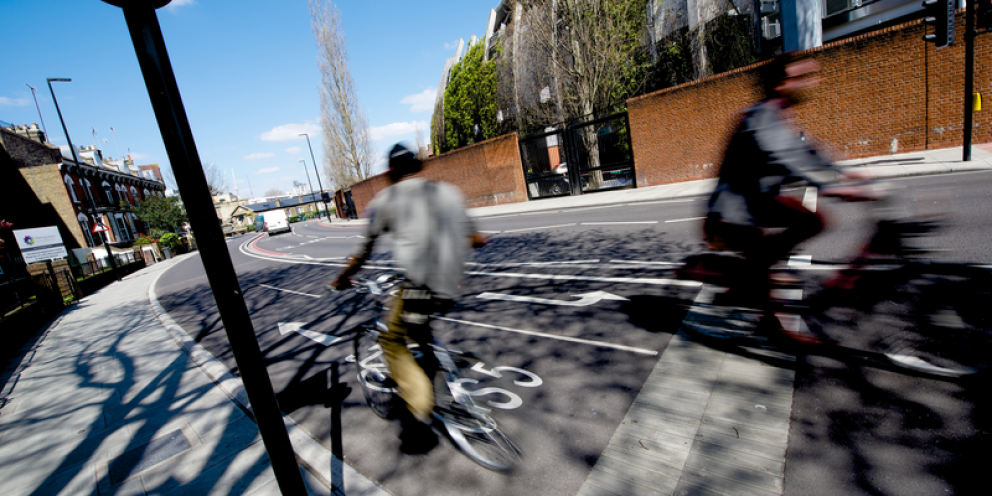Cycleway 4 Gets Pedalling Sooner Than Planned
Work on Cycleway 4 in Greenwich is set to begin later this year, several months earlier than initially planned and London’s record-breaking Santander Cycles bike...
Read Full Article
Cycle Superhighways, Quietways, the cycle hire scheme, cycle parking, upgrades to junction design and mini-Holland programmes – they’re all part of London’s cycling infrastructure. But is it working?
The London Assembly Transport Committee report ‘London’s Cycling Infrastructure’ was published on March 23. It reveals:
The Transport Committee report recommends:
Keith Prince, Chairman of the London Assembly Transport Committee said: "There are major and minor things that need to be considered urgently with regard to cycling infrastructure. The term ‘Superhighway’ for example, creates the wrong impression for what this infrastructure is supposed to deliver. It appears to emphasise cycling long distances at high speed, which may not be the best way to attract a wider range of inexperienced people to cycle.
"We also are concerned that we will not see sufficient progress before the end of this Mayor’s term on the six new routes announced at the beginning of this year. We therefore ask TfL to publish a timeline for these new routes and to set a date by which plans for the 19 remaining routes will be published.
"London will not become a cycle-friendly city overnight. It will take sustained political effort over many years to build a network that people of all ages and abilities will want to use. Political leadership is needed to drive through improvements in cycling infrastructure and we would urge the Mayor to provide this to ensure Londoners have access to higher quality cycling routes.”
Dissenting view
David Kurten of UKIP does not agree with most of the recommendations and would like to halt the Cycle Superhighway building programme and is of the very strong opinion that Quietways should only be built where there is uninterrupted cycling for at least a mile. He recommends that Liveable Neighbourhoods should not be deliberately designed to penalise motorists.
The routes of the problem
Design work for the next generation cycle routes in inner and outer London was supposed to start in January with £142m to be invested. The new routes have been developed using Transport for London’s Strategic Cycling Analysis which identified connections where new cycling infrastructure is required to enable more people to cycle. The six new routes will run from Tottenham in the north, to Peckham in the south, and from Barking in the east, to Willesden Junction in the west.
1. Wembley to Willesden Junction
5km route would be north-west London’s first major cycle route, connecting Wembley, Stonebridge Park and Willesden Junction. Future sections will connect to planned infrastructure in west London such as CS9 and CS10.
2. Lea Bridge to Dalston
3km route to link City and Waltham Forest by filling the gap between Lea Bridge Road and Cycle Superhighway 1 at Dalston.
3. Ilford to Barking Riverside
8km route to link two bustling outer London town centres and a major growth area with up to 10,800 new homes and a new London Overground connection – while enhancing access to the Elizabeth line and London Overground services.
4. Hackney to the Isle of Dogs
8km route to stretch from Hackney to the Isle of Dogs via Canary Wharf, Mile End and Victoria Park.
5. Rotherhithe to Peckham
4km route to link Peckham with key and growing destinations such as Canada Water and Surrey Quays, and connect up other cycling routes such as Quietway 1 and the proposed Cycle Superhighway 4.
6. Tottenham Hale to Camden
8km route to connect major town centres and will cover seven junctions identified as being among the 73 with the worst safety records.
Latest year–on-year figures show that cycling grew in London by nearly 10% in 2016 according to the Mayor's Office which is being criticised for a lack of progression on the proposed routes detailed above.
Article written by Cathryn Ellis | Published 29 March 2018
Work on Cycleway 4 in Greenwich is set to begin later this year, several months earlier than initially planned and London’s record-breaking Santander Cycles bike...
Read Full ArticleThe City of London Corporation has voted to make the Square Mile the first area in the UK with a 15mph speed limit - and to regularly close streets to allow pop-up food...
Read Full ArticleProjects to highlight the safest roads for cyclists to use, create a database of all the UK’s trees and launch an indoor mapping system to help people find their...
Read Full ArticleThe Building Engineering Services Association is organising two sponsored walks to mark National Clean Air Day. The first event will take...
Read Full ArticleCommercial cleaning social enterprise NGB Clean is making use of discarded inner tubes and tyres dumped in their clients’ office bike stores. NGB Clean, a...
Read Full ArticleFrom 5 January 2025, drivers entering New York State will have to pay a Congestion Relief Zone Toll of up to $9 per day. This will eventually increase to $12 in 2028...
Read Full ArticleA policy paper launched at the Building Engineering Services Association’s World Ventilation Day event suggests there is a “two-year window of...
Read Full ArticleAn awareness day to promote the impact of humidity control in our daily lives and the buildings we live and work in has launched. The Humidity Control Group, a...
Read Full ArticleConfusion and misinformation about the concept of 15 minute cities were partly responsible for a change in England’s transport policy. Watch the...
Read Full ArticleNew research shows that asthmatics in Oxford had fewer hospital stays in 2020, largely due to reduced air pollution during the national lockdown. Falling...
Read Full Article